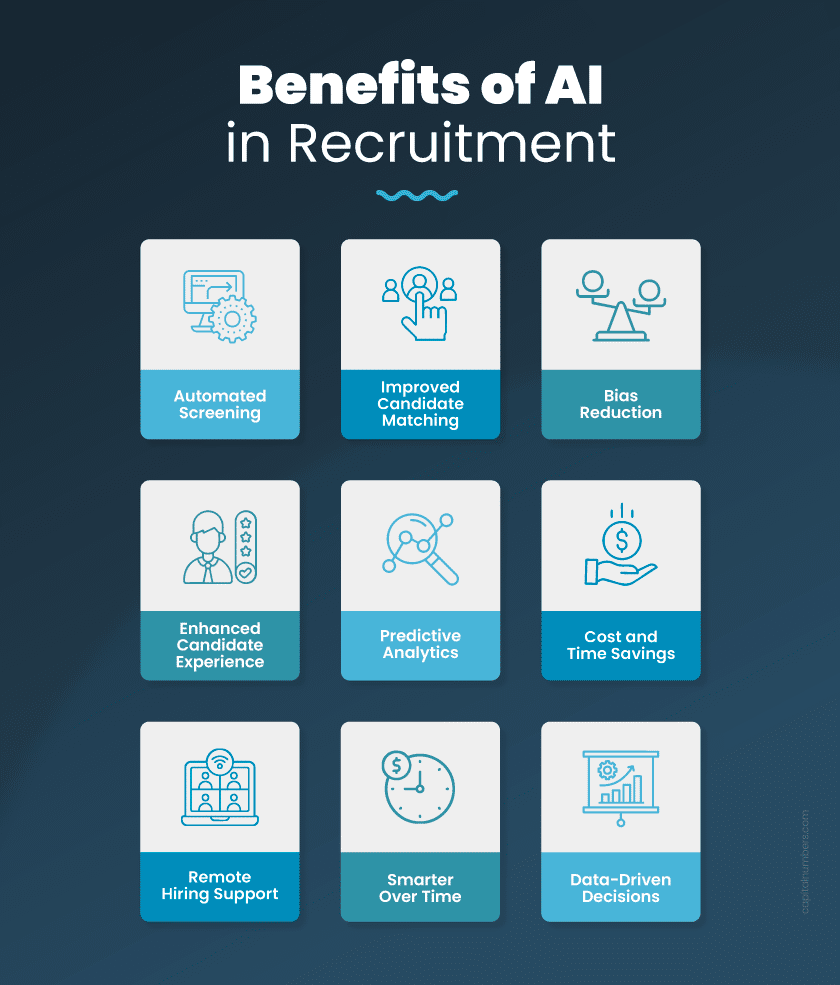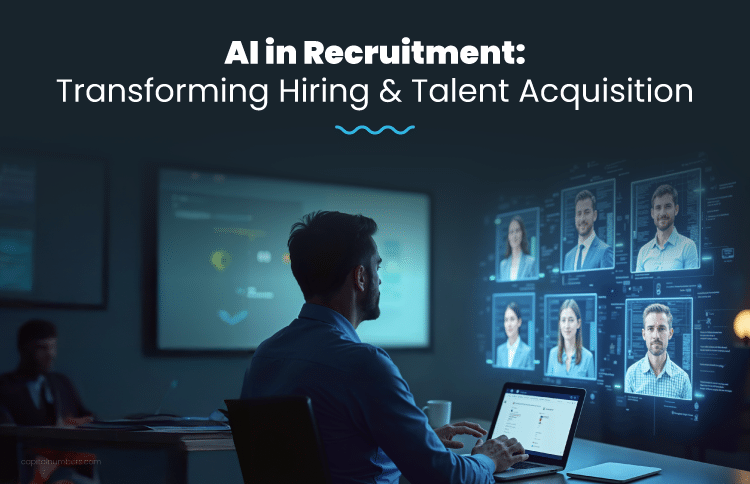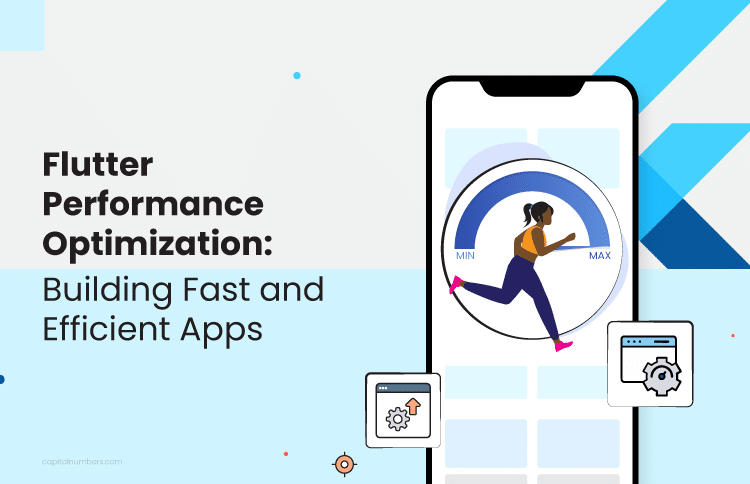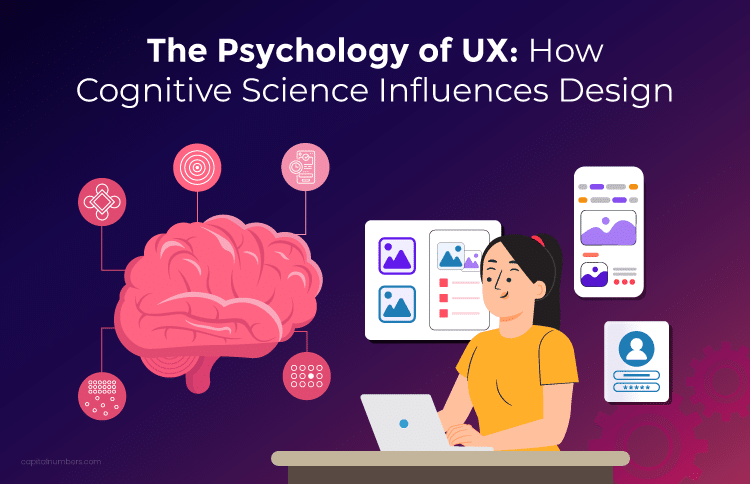AI in Recruitment: Transforming Hiring & Talent Acquisition
Table of Contents
What if hiring could be faster, smarter, and free from human bias? Sounds like a daydream? No, with AI in recruitment, it’s now a reality. AI-powered tools are helping talent acquisition teams automate tasks like screening resumes, matching candidates to roles, and even conducting video interviews – dramatically speeding up the recruitment process and ensuring better hiring decisions.
AI development companies are leading the way in this transformation, offering businesses the tools to tackle hiring challenges. With AI, recruitment becomes faster and more efficient, allowing businesses to streamline their hiring processes and make better data-based decisions. Whether you have a small business or a large enterprise, AI can help improve your talent acquisition strategies.
Want to learn more? Keep reading to discover how AI is changing the way companies hire!
Benefits of AI in Recruitment
AI is reshaping various businesses, and recruitment is one of the key sectors where its impact is most pronounced. Many companies, including startups, use AI-powered recruitment tools to tackle everyday hiring challenges and improve efficiency, accuracy, and candidate experience.

Here’s why AI is beneficial for recruitment:
-
Automated Screening
AI quickly scans resumes and applications, filtering out candidates who don’t meet the required qualifications. This saves time and ensures that only the most suitable applicants are considered.
-
Improved Candidate Matching
AI analyzes job descriptions and candidate profiles, matching the best-fit candidates based on skills, experience, and cultural fit. This leads to better alignment and more informed hiring decisions.
-
Bias Reduction
By focusing on data-driven insights, AI helps reduce unconscious bias in recruitment. This promotes a fairer, more inclusive hiring process, ensuring candidates are evaluated based on merit rather than personal demographics.
-
Enhanced Candidate Experience
AI-driven tools, such as chatbots, provide candidates with timely updates and feedback on their application status. This improves communication, making the recruitment process smoother and more engaging for candidates.
-
Predictive Analytics
AI uses historical data and other factors to predict a candidate’s potential success in a role. This helps businesses make smarter hiring decisions, reduce turnover, and improve long-term employee retention.
-
Cost and Time Savings
AI helps businesses save time and money by automating repetitive tasks and speeding up recruitment. This reduces the duration of the hiring process and helps avoid unfilled positions, lowering indirect recruitment costs.
-
Remote Hiring Support
AI enables features like virtual interviews and online assessments, facilitating remote hiring and access to a global talent pool. This makes it easier for businesses to find the best candidates, regardless of location.
-
Smarter Over Time
AI systems improve with each recruitment cycle, learning from new data and refining their algorithms. This continuous improvement allows AI to become more effective in matching candidates, predicting outcomes, and streamlining recruitment processes.
-
Data-Driven Decisions
AI supports recruitment by providing objective, data-driven insights. This reduces reliance on subjective judgments, leading to more consistent and informed hiring decisions aligned with the company’s goals.
Along with established brands, startups are also using AI to improve hiring accuracy, efficiency, and fairness, all while making the recruitment process faster and more cost-effective.
5 Ways Businesses Use AI in Recruitment
If you are curious about how AI is revolutionizing recruitment, you are not alone. Here are the key ways that businesses are using AI recruitment technology to enhance their hiring processes:
1. Optimizing Job Description Creation
AI tools assist in writing job descriptions by analyzing successful job listings. These tools help identify the most effective keywords and skills to attract suitable candidates. By using AI to create job descriptions, businesses can make sure they appeal to the right talent, improving the chances of finding the best fit.
2. Simplified Interview Scheduling
AI automates the interview scheduling process by syncing with candidates’ calendars and suggesting available times. This reduces the chances of scheduling conflicts and ensures interviews happen smoothly. By automating this step, businesses save time and avoid the hassle of back-and-forth communication, making the process more efficient for both sides.
3. Streamlining the Interview Process
AI optimizes interviews by automating tasks like pre-screening and evaluation. It analyzes candidate responses, scores them based on set criteria, and helps recruiters focus on the best candidates. This speeds up the process, reduces human error, and ensures that only the most qualified candidates move forward in the hiring process.
4. AI-Powered Job Simulations
Generative AI creates customized simulations that mirror real job tasks, allowing candidates to demonstrate their skills in practical scenarios. These simulations give recruiters a clearer idea of how a candidate might perform in the actual role, assessing problem-solving abilities and adaptability in a more realistic setting than traditional interviews.
5. Continuous Skill Development for Talent Acquisition Teams
AI helps talent acquisition teams stay updated with the latest trends and best practices in hiring. By analyzing data and offering insights into effective strategies, AI tools ensure that talent acquisition teams continuously improve. This helps them attract and assess top talent with the most current and efficient methods.
These are some of the common ways businesses of all sizes are using AI to make recruitment efficient, stress-free, and more effective in finding the right talent.
Strategies for Effective AI Adoption in Talent Acquisition
Adopting AI in recruitment can improve hiring efficiency and outcomes, but it’s important to implement it correctly. Following these strategies can help businesses use artificial intelligence effectively and ensure it adds value to the recruitment process.
-
Align AI Use with Recruitment Goals:
Before using AI in recruitment, make sure it aligns with your hiring goals. Whether it is improving the quality of candidates, speeding up the hiring process, or promoting diversity, having clear objectives helps ensure AI contributes to your overall recruitment success.
-
Ensure Clean, Unbiased Data Training Sets:
AI depends on data, so it’s essential to use accurate, clean, and unbiased data to train the system. Using poor-quality or biased data can lead to bad hiring decisions. Ensuring your data is diverse and representative will make AI more effective and fair in predicting candidate success.
-
Pilot and Iterate Before Scaling:
Start by testing AI on a smaller scale before fully rolling it out. A pilot project helps you see if the system works as expected, find any issues, and make improvements. This process allows you to refine the AI tool and ensure it’s ready for broader use.
-
Blend Human and Machine Intelligence:
AI should complement human judgment, not replace it. While AI can handle repetitive tasks and analyze data, humans are needed to make final decisions, especially when it comes to culture fit or more complex evaluations. Combining human and AI strengths leads to better hiring decisions.
-
Train Teams to Work with AI Tools:
For AI to be effective, your talent acquisition team needs to know how to use it properly. Provide training on how AI tools work, how to interpret their results, and how to collaborate with them. Regular training helps your team make the most of AI and ensures a smooth adoption.
So, follow these strategies to ensure a smooth and successful AI adoption in your recruitment process. By aligning AI with your goals, ensuring unbiased data, and blending human expertise, you can maximize its potential and improve your hiring outcomes.
Key AI Technologies That Empower Recruitment
There are various AI-driven technologies that help businesses overcome hiring challenges and streamline their recruitment process. Eager to know more about these game-changing technologies? Here are the top ones transforming recruitment today:
-
Natural Language Processing (NLP)
NLP allows AI to process human language, helping analyze resumes, cover letters, and interviews to extract relevant data, improving candidate matching and decision-making in recruitment.
-
Machine Learning (ML)
ML algorithms analyze past hiring data to predict candidate success, automate resume screening, and match candidates to roles more accurately, improving efficiency over time.
-
Robotic Process Automation (RPA)
RPA automates repetitive tasks like resume screening, email sending, and database updates, saving time and allowing recruitment teams to focus on more strategic aspects of hiring.
-
Facial Recognition Technology
Facial recognition AI examines candidates’ facial expressions during video interviews to assess their emotions and engagement, providing insights into their personality and fit for the role.
-
Generative AI
Generative AI creates customized job simulations and scenarios, allowing candidates to demonstrate their skills in practical settings, giving recruiters more accurate insights into their abilities and potential performance.
Based on your requirements, you can incorporate the necessary AI technologies into your recruitment platform to simplify the hiring process, enhance productivity, and make better-informed hiring decisions.
You May Also Read: How Generative AI Is Transforming Businesses in 2025
Challenges and Ethical Concerns in Using AI for Recruitment
Nowadays, businesses of all sizes are using AI to improve their recruitment processes. However, using AI in hiring comes with several challenges and ethical concerns that need attention. Here are some key issues to consider:
-
Algorithmic Bias and Fairness:
AI models are only as good as the data they’re trained on. If the data has biases, AI systems may repeat these biases, leading to unfair hiring decisions. Companies must ensure their models are fair and unbiased to prevent discrimination.
-
Data Privacy and Candidate Consent:
AI recruitment tools rely on candidate data, raising privacy concerns. Companies need to obtain clear consent from candidates to use their data and ensure they follow privacy laws to protect it.
-
Lack of Transparency:
Many AI models, such as black box models, are difficult to understand, making it hard to know how decisions are made. This lack of transparency can be problematic, especially when explaining decisions to candidates.
-
Legal and Compliance Risks:
AI in recruitment must follow legal rules, such as GDPR in the EU and EEOC in the US. Failure to do so can lead to serious legal and financial risks.
-
Over-Reliance on Tech vs. Human Intuition:
AI can process large amounts of data, but it may miss key aspects like cultural fit or soft skills. Relying too much on AI can result in overlooking important human factors vital for building strong teams.
You should address these challenges with effective strategies to ensure AI is used fairly, transparently, and alongside human judgment, creating a responsible and balanced recruitment process.
Real-World Examples of AI in Recruitment
AI is transforming recruitment across industries. Here are some real-world examples of how businesses are using AI to improve their hiring process:
-
Unilever:
Unilever partnered with Pymetrics, a leader in AI recruitment, to develop an online platform that allows candidates to be assessed remotely via their computer or mobile screen.
-
LinkedIn:
AI in LinkedIn’s “Talent Solutions” platform helps recruiters find the best candidates based on profiles, skills, and job experience.
-
L’Oreal:
L’Oreal uses the chatbot Mya to streamline recruitment by answering questions, pre-screening resumes, and conducting initial interviews.
-
IBM Watson Recruitment:
IBM Watson analyzes resumes and job descriptions to match candidates to suitable roles and predict future success.
-
HireVue
HireVue uses AI-powered video interviewing and assessments to analyze candidates’ responses, facial expressions, and tone, helping companies assess skills, cultural fit, and potential more accurately.
These real-world examples show how AI is changing recruitment by automating tasks, helping with better decision-making, and improving the candidate experience, making it easier for companies to find the right talent.
The Future of AI in Recruitment
The future of AI in the recruitment industry looks incredibly promising, with AI set to make the recruitment process faster, more efficient, and highly personalized. Here’s how AI will shape recruitment in the coming years:
-
Predictive Hiring at Scale:
AI will enable businesses to predict hiring needs and identify top candidates more effectively. With AI-powered tools, companies can hire at scale, streamlining the process and reducing hiring challenges.
-
GenAI in Personalized Candidate Outreach:
Generative AI will be used to create personalized messages for candidates, improving engagement and ensuring communication resonates with individual preferences. This will enhance the overall candidate experience.
-
Deeper Integration with HR Ecosystems:
AI will integrate more deeply with HR systems like Applicant Tracking Systems (ATS), CRM tools, and Learning Management Systems (LMS). This will streamline the recruitment process and provide better insights into talent acquisition strategies.
-
Skills-Based Hiring Over Credential-Based Hiring:
AI will shift the focus from credentials to skills in the hiring process. By evaluating candidates based on their abilities rather than formal qualifications, companies can make more accurate hiring decisions and find the best talent.
-
AI’s Role in Forecasting Future Workforce Needs:
AI will play a key role in forecasting future workforce needs, helping businesses understand skill shortages, and plan for long-term hiring requirements. This will allow companies to align their talent acquisition strategies with future growth goals.
As the possibilities are vast, we can predict that AI will continue to shape the future of recruitment, making processes faster and more personalized. However, the future holds even greater potential, with advancements we can only begin to imagine.
Frequently Asked Questions
1. Will AI replace HR?
AI won’t replace HR but will automate repetitive tasks like screening resumes and scheduling interviews. HR professionals will still be needed for decision-making, relationship-building, and managing company culture.
2. Is AI only for large companies in recruitment, or can startups use it too?
AI in recruitment is not just for large companies—startups can also benefit from it. AI tools are becoming more affordable and help small businesses streamline hiring processes and find the best candidates faster.
3. How does AI impact the candidate experience during recruitment?
AI improves the candidate experience by providing quick responses and personalized communication. It also makes the application process smoother, ensuring candidates are kept informed and engaged throughout.
4. Can AI help with diversity and inclusion initiatives when hiring?
Yes, AI can help reduce bias in hiring by focusing on skills and qualifications rather than personal characteristics. This ensures a more fair and inclusive recruitment process.
5. How does AI help companies find passive candidates who aren’t actively looking for jobs?
AI helps find passive candidates by analyzing online data and identifying people with the right skills. It can then reach out to them, even if they aren’t actively job hunting.
Final Words
AI is shaping the future of recruitment, making the hiring process faster, smarter, and more efficient. As AI continues to evolve, it will automate more tasks, improve decision-making, and help businesses find the best talent faster. For companies of all sizes, embracing AI will be key to staying competitive and meeting future hiring needs. With AI driving recruitment forward, the way we hire will only become more streamlined and effective in the years to come.














